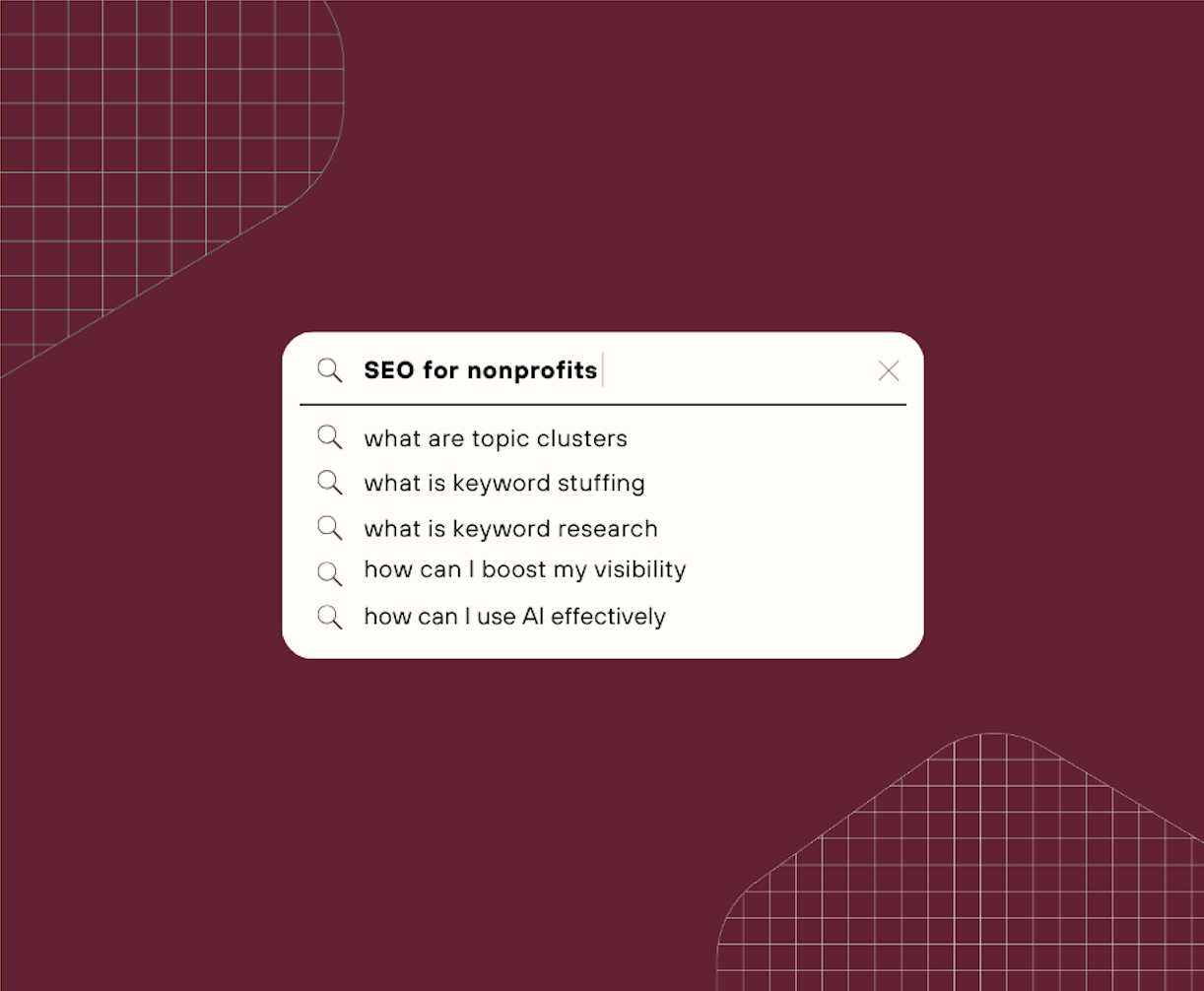Since the beginning of search engine optimization (SEO), keywords have been at the center of any content strategy. But with the increasing complexity of search engines’ algorithms, the ability to rank high on Google now expands much wider beyond keywords.
As search engines evolve and technology advances, our approach to content should evolve as well. But for organizations that are less experienced in SEO, exploring an updated strategy can feel intimidating when unfamiliar with how modern search engines work.
In what might seem unexpected, search engines today are actually making it easier for you to get more eyes on your mission. In this article, we’ll explore more into why that’s the case and how you can use SEO to build a meaningful connection with your target audience.
How has SEO changed?
First, it’s important to understand the history of SEO to help debunk the outdated strategies that you might still be following.
If you were doing SEO in the early 2000s, SEO strategy generally revolved around making sure your keyword showed up on a website as often as possible. This is also known as keyword stuffing.
Unfortunately, this strategy led to choppy writing, poor readability, and content that lacked value. Optimizing for search engines has evolved substantially from that point and now, it actually rewards content that’s written for readability instead.
Today, Google is the dominating search engine, accounting for 91.5% of all web searches as of January 2024. Being the leader in SEO and its evolution, it’s criticafl to understand how Google operates and to build your strategies around its algorithms.
Search engine optimization’s modern advances are a result of recent Google algorithm updates. Here are a few key Google updates that have changed the landscape for how we use keywords:
-
1
Hummingbird: The Google Hummingbird update happened in 2013. It was the first big update where Google began to understand language as “strings to things”: instead of Google seeing a meaningless order of words, it now understands these words in the context of topics, people, places, and organizations–in other words, actual entities. For instance, when you type “charities near me” in your search bar, Google is not going to find you a web page with those exact words. Instead, it contextually understands that you’re looking for a charity in your area, providing a list of organization websites within your location. When a search is made, Google pulls from its search of entities, trying to find the most relevant answer to that query.
-
2
RankBrain: In 2015, the Google RankBrain update was released to evolve this concept of “contextual searches” through machine learning. Machine learning refers to the process of computers, AI, or algorithms teaching themselves in order to improve, rather than needing humans to manually update them. The RankBrain update allowed Google to learn from its daily 8.5 billion searches to improve its understanding of language and present better search results.
-
3
BERT: The Google BERT update in 2019 focused on Natural Language Processing (NLP). NLP is how computers understand language, which in the past has been “not that great”. In response, researchers have developed different models to help machines better understand components of language: classification, sentiment analysis, and entity recognition. BERT brings these components together to better understand the nuances and complexities of natural language. For example, in past SEO, “stop words” (on, a, the, etc.) were ignored, but now Google understands the important role that these words play in adding nuance to the meaning of a sentence. Even with the human habit of speaking erroneously or with poor grammar, BERT helped Google’s search engine interpret our conversational language much more accurately.
-
4
The Helpful Content Update (HCU): while the HCU originally launched in 2022, Google rolled out its latest—and most impactful—edition in September 2023. Largely coinciding with the rise in AI-generated content, the purpose of the HCU is to promote “people-first content.” It’s a stark indicator of Google’s efforts to combat spammy AI content and prioritize content that’s genuinely valuable for its human users.
-
5
The March 2024 Core Update: this update brought a “seismic shift” to the SEO industry, and many sites noticed a dramatic drop in site rankings as it rolled out. Building off of the HCU, a critical focus of the March Core Update is to reduce “unhelpful, irrelevant, and unoriginal content from search results.” Notice that both updates have similar themes: regardless of tech advancements, Google still prioritizes content for humans—not search engines.
The key takeaway here is that, with each update, Google continues to centre its users. It’s continuing to optimize the entire search experience for its users, and so should you.
That means that yes, the days of keyword stuffing are over. Your website, your content as a whole, and your audience’s user experience impact your rankings now.

Are keywords still relevant in SEO today?
So if Google is getting better and better at understanding content, do keywords still matter for SEO?
What are keywords? Keywords basically are searches that people make. They’re questions users have that they turn to search engines for. There, Google sorts through its index of pages to find the most relevant answer to that search.
In other words, keywords are questions, and your website ranks for those questions by providing answers through your content. So by doing keyword research and optimizing your pages to rank for keywords, you’re learning about your users and the questions they have so you can create content that they’re interested in.
Even in the age of AI, keywords still play a massive role in uncovering the questions users have and optimizing your content to provide the best answer possible by naturally weaving those keywords in. To better contextualize this, here’s an excerpt from Google’s How Search Works report:
“Search algorithms look at many factors and signals, including the words of your query, relevance and usability of pages, expertise of sources, and your location and settings. The weight applied to each factor varies depending on the nature of your query.”
As you can see, keywords still matter in SEO, but other factors are equally as important.
So, what can I do to show up in search results in 2024?
-
1
Prioritize the user experience. Above all else, always think about your audience. This means that your website should optimize your audience’s experience along the way.
This includes factors like:
- Your website’s page speed and interactivity
- Writing for scannability and readability
- Following accessibility best practices
- User-friendliness
- Optimizing for each device (desktop, tablet, and mobile)
- Clear purpose and logical hierarchy with your content
Along with covering the SEO fundamentals and conducting proper keyword research, optimizing your website and content at large will positively impact your rankings.
-
2
Build your content around topic clusters. Instead of thinking of keywords as individual entities to rank for, focus on topic clusters. These are groups of webpages built around a central theme, with subtopic pages diving deeper into the subject.
Following a topic cluster approach tells search engines that you’re an authority figure in the subject, improve your audience’s experience by showing them greater amounts of relevant content in one place, and improve your website’s structure with better internal linking practices.
Here’s how to build out topic clusters:
- Identify your main topics and areas of expertise. For example,
- Research subtopics. More specifically, user search queries.
- Create a pillar page. This is a high-level overview.
- Craft subtopic pages. These are deeper dives into each subtopic (i.e. blogs).
- Link between the pillar and subtopic pages with anchor text.
Want to know more about topic clusters? We wrote an entire blog post about it. Check out our guide to topic clusters for nonprofits.
-
3
Match content to your audience’s search intent. While building topic clusters is crucial, you’ll also want to consider search intent. This is the reason behind why someone is conducting a specific search.
There are four main types of search intent: informational, investigational or navigational, commercial, and transactional (learn about the details of them here).
Once you identify what type of search intent you’re aiming for, you can tailor your content appropriately. Beyond basic keyword research, this helps search engines accurately categorize your content and show it to the right audience. -
4
Consider AI. As AI becomes more pervasive in digital spaces, it’s important to understand Google’s perspective on it.
To clarify, Google doesn’t penalize AI-written content. But we don’t recommend writing every piece of content with AI without human intervention. Instead, you can harness it as an effective tool to make your life easier—especially to create content at scale.
Publishing high volumes of blog content does positively impact search rankings; Google favours websites that frequently publish new content. But as we touched on above with the Helpful Content Update, Google is cracking down on unhelpful content. And that may include spammy AI-written content—especially if it’s not genuinely helpful for, and targeted to, your unique audience.
So, by all means: use Large Language Models (LLMs) like ChatGPT and Gemini as a tool for ideation, execution, and writing support. Just keep in mind that writing exclusively AI-generated content without edits from a human may negatively impact your rankings.

Speaking of AI… what does the future of SEO look like?
It’s tough to say what the future of SEO holds exactly, but here are some thoughts.
AI Integration in Search
Advancements in AI and machines will certainly impact SEO. It won’t be long before features like Search Generative Experience (SGE) and Google’s new AI revamp dominate the search experience.
These features allow users to get the answer they’re immediately looking for without clicking further, also known as zero-click searches (more on that below). As a result, this may negatively impact your search rankings and you might see significant drops in traffic.
Our suggestion for this? Keep doing what you’re doing. Follow the same SEO principles and don’t stop publishing content because you think there’s no point. At the end of the day, AI features are pulling all of their information from the web!
More Zero-Click Searches and Knowledge Panels
As mentioned, search engines will provide direct answers to user queries, leading to a rise in zero-click searches and user reliance on knowledge panels. This means optimizing content to be informative and concise enough to potentially be included in a knowledge panel.
Make sure that your content is simple, condensed, and to the point. And since your traffic will be impacted, you may want to use new metrics to measure your content.
Don’t just look at pageviews or users. Instead, consider measuring your content based on metrics such as bounce rate (now engagement rate in GA4), average session duration, click-through-rate, and pages per session.
Zero-click searches will impact traffic numbers. Focusing on engagement-focused metrics can help you actually identify what content is resonating with your readers.
The Rise of Visual and Voice Search
Search engines will likely place a greater emphasis on optimizing content for visual and voice search. For example, someone using Siri to search, or even uploading a video into search to help you answer a question—one of Google’s latest advancements.
This means optimizing images, videos, and podcasts for the search terms you want to show up for, and ensuring content is structured for readability by AI assistants.
This best practice isn’t far off from optimizing visual content for SEO today. Just make sure you’re adding appropriate alt-tags, using the right file names (not “screenshot-1284.jpg”), and compressing your images and videos for better loading speeds.
Google may be more complex, but your mindset doesn’t have to be.
The increased sophistication of search engines might be overwhelming. But at its core, the principles remain the same: prioritize your users and create consistent, authentic content on topics that best serve your community.
Briteweb’s Director of Strategy, Thomas Gage, says his biggest advice is this:
Seamless user experience and authentic content will help you grow a meaningful relationship with your audience. If you do that well and consistently, we’re confident that you will see organic traffic increase to your website.
To learn more about how to evolve your SEO content strategy, contact Briteweb for support.
Learn more about SEO for nonprofits
Insights
The Fundamentals of Technical SEO
On-page SEO, which looks at how you optimize your website's pages for people, focuses on writing for readability.
Insights
On-page SEO: 5 Simple Ways to Get Your Nonprofit Found on Google
Search engine optimization, better known as SEO, is the practice of optimizing your organization’s website to improve its chances of appearing in search results.
Insights
What is the Yoast SEO WordPress Plugin and How to Use It
Yoast SEO is a WordPress plugin that improves your website’s rankings on search engines, by helping you optimize your site’s content and keywords. A lot of what Yoast SEO does is automated, but still needs your input and some planning.




